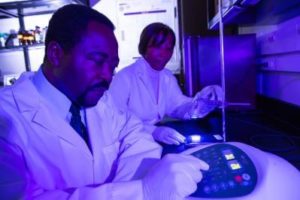medical college of wisconsin
Family or no, marrow, blood stem cell transplant survival rates equal
Patients who receive a blood stem cell transplant from a donor outside of their family to treat leukemia and other blood diseases are more likely to have graft failure but less likely to experience graft-versus-host disease, a condition caused…
Scientists and physicians use genetic sequencing to identify and treat unknown disease
A collaborative team of scientists and physicians at the Medical College of Wisconsin and Children’s Hospital of Wisconsin uses genetic sequencing to identify and treat an unknown disease.
For the one of the first times in medical history, researc…
Plant scientists move closer to making any crop drought-tolerant
RIVERSIDE, Calif. — Drought-tolerant crops have moved closer to becoming reality.
A collaborative team of scientists has made a significant advance on the discovery last year by the University of California, Riverside’s Sean Cutler of pyrabactin…
Growing drought-tolerant crops inching forward
A collaborative team of scientists led by researchers at The Medical College of Wisconsin, in Milwaukee, has used the tools of structural biology to understand how a synthetic chemical mimics abscisic acid (ABA), a key stress hormone that helps plan…
Radiologists call for national strategy to address medical imaging overuse
Overutilization of medical imaging services exposes patients to unnecessary radiation and adds to healthcare costs, according to a report appearing online and in the October issue of the journal Radiology that calls on radiologists to spearhead a co…
Removing Portion of Spleen Effective in Treating Inherited Childhood Anemias
Researchers have shown that removing a portion, instead of all, of the spleen, can successfully treat children with a variety of congenital anemias while preserving important splenic immune function. In the largest study of its kind in the U.S., the researchers performed the surgery, known as a partial splenectomy, on 25 children with congenital forms of anemia caused by abnormal red blood cells. Typically, these children suffer from fatigue, jaundice and extreme vulnerability to infections that can require repeated hospital or physician visits. Many also need repeated blood transfusions.


